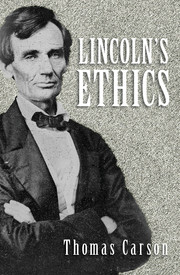Book contents
- Frontmatter
- Dedication
- Epigraph
- Contents
- Detailed Contents
- List of Maps and Figures
- Acknowledgments
- How This Book Came to Be
- 1 Introduction
- PART ONE LINCOLN THE POLITICIAN AND COMMANDER IN CHIEF
- PART TWO LINCOLN'S MORAL CHARACTER
- 7 Lincoln's Virtues
- 8 Other Salient Features of Lincoln's Character and Personality
- 9 Lincoln's Marriage and Family Life, and What They Reveal about His Character
- 10 Was Lincoln a Racist?
- 11 Conclusion
- Bibliography
- Index
- Plate Section
11 - Conclusion
from PART TWO - LINCOLN'S MORAL CHARACTER
Published online by Cambridge University Press: 05 May 2015
- Frontmatter
- Dedication
- Epigraph
- Contents
- Detailed Contents
- List of Maps and Figures
- Acknowledgments
- How This Book Came to Be
- 1 Introduction
- PART ONE LINCOLN THE POLITICIAN AND COMMANDER IN CHIEF
- PART TWO LINCOLN'S MORAL CHARACTER
- 7 Lincoln's Virtues
- 8 Other Salient Features of Lincoln's Character and Personality
- 9 Lincoln's Marriage and Family Life, and What They Reveal about His Character
- 10 Was Lincoln a Racist?
- 11 Conclusion
- Bibliography
- Index
- Plate Section
Summary
Having examined Lincoln's actions and character, in this chapter I review my main conclusions, beginning with his morally controversial actions. In his role as a politician, Lincoln made many morally fraught decisions regarding slavery and the legal rights of African Americans. Some of those decisions have been the subject of considerable criticism. In practice, he was a utilitarian and would have justified his decisions and policies about those issues on utilitarian grounds. This helps explain his willingness to make compromises and pursue policies that reduced rather than ended injustices in cases in which he thought that it was not possible to completely or immediately end the injustices. Indeed, most of his actions and policies in question can be justified on utilitarian grounds. But defending those actions and policies does not require that we accept utilitarianism. Other reasonable moral principles also justify them.
These are some key examples. Despite the horrendous injustice of American slavery, Lincoln was justified in moving slowly and cautiously to end it. He did not have the power or constitutional authority to completely abolish slavery when he took office. It would have been both futile and counterproductive for him to have declared the complete abolition of slavery at the beginning of his presidency.
His August 1862 letter to Horace Greeley might seem to show that he was morally obtuse in thinking that the abolition of slavery was only of instrumental importance compared to the goal of preserving the Union. But appearances can be misleading. We should not assume that this letter was completely candid. Given Lincoln's legitimate worries about the Supreme Court and his need for the support of the border states and of the many soldiers in the Union army who were not willing to fight to end slavery, it would have been very risky and politically inexpedient for him to say that he was fighting the war primarily to end slavery.
- Type
- Chapter
- Information
- Lincoln's Ethics , pp. 402 - 410Publisher: Cambridge University PressPrint publication year: 2015



